The rise of sustainability platforms: $1.3 billion market in 2024 amid climate records

In short
- The sustainability platforms market reached $1.3 billion in 2024, with 23% CAGR forecasted through 2029, according to IoT Analytics’ Sustainability Platform Market Report 2025–2029 (published February 2025).
- Sustainability platforms are an emerging software category enabling companies to monitor carbon emissions, measure sustainability and ESG metrics, and comply with evolving regulatory requirements.
- The market is highly fragmented, with over 200 vendors identified.
- These platforms are in the early stages as challenges around integration, the lack of universal data and reporting standards, and data quality remain.
Why it matters
- For software vendors: The sustainability platform market is highly fragmented, presenting significant room for differentiation and innovation.
- For corporate adopters: As regulatory pressures increase and various stakeholders demand sustainability transparency, companies must adopt robust sustainability software tools to ensure compliance.
Sustainability platform market update and drivers
Sustainability software market is growing amid climate and regulatory pressures. A new software category is starting to emerge: sustainability platforms. These are software tools that help organizations understand, manage, and improve their sustainability performance. In 2024, the market for sustainability platforms reached $1.3 billion, and it is expected to grow at 23% CAGR to surpass $3.7 billion by 2029, according to IoT Analytics’ 219-page Sustainability Platform Market Report 2025–2029 (published February 2025).
Several factors fuel this growth:
- Ever-warming climate conditions – In January 2025, the World Meteorological Organization announced that the 2024 average global surface temperature—the hottest on record—reached 1.55°C (±0.13°C) above the late-1800 second industrial revolution period average, based on its analysis of 6 datasets from various national, academic, and non-profit organizations.
- Regulatory push – In response to this warming and to align with international climate agreements (e.g., the Paris Climate Accords), governments worldwide are tightening sustainability reporting standards, which is driving sustainability platform adoption. For example, the EU adopted the Corporate Sustainability Reporting Directive (CSRD) in 2022, and by January 1, 2026, nearly 50,000 companies doing business in Europe will be required to disclose detailed corporate sustainability data.
- Corporate action – Nearly 50% of Forbes 2000 companies now have net-zero goals. Businesses are increasingly recognizing sustainability as a strategic advantage rather than just a compliance requirement since investors are increasingly considering sustainability-related information when making investment decisions, and some other stakeholders and customers are demanding or rewarding climate action.
Amid these drivers, sustainability platforms are becoming essential tools for companies to measure carbon footprints, track environmental, social responsibility, and governance (ESG) metrics, and ensure compliance with evolving regulations.
The insights from this article are based on
Sustainability Platforms Market Report 2025–2029
A 219-page report on the market for sustainability software platforms for both carbon (footprint) management and ESG reporting (incl. market share & sizing, competitive landscape and key trends)
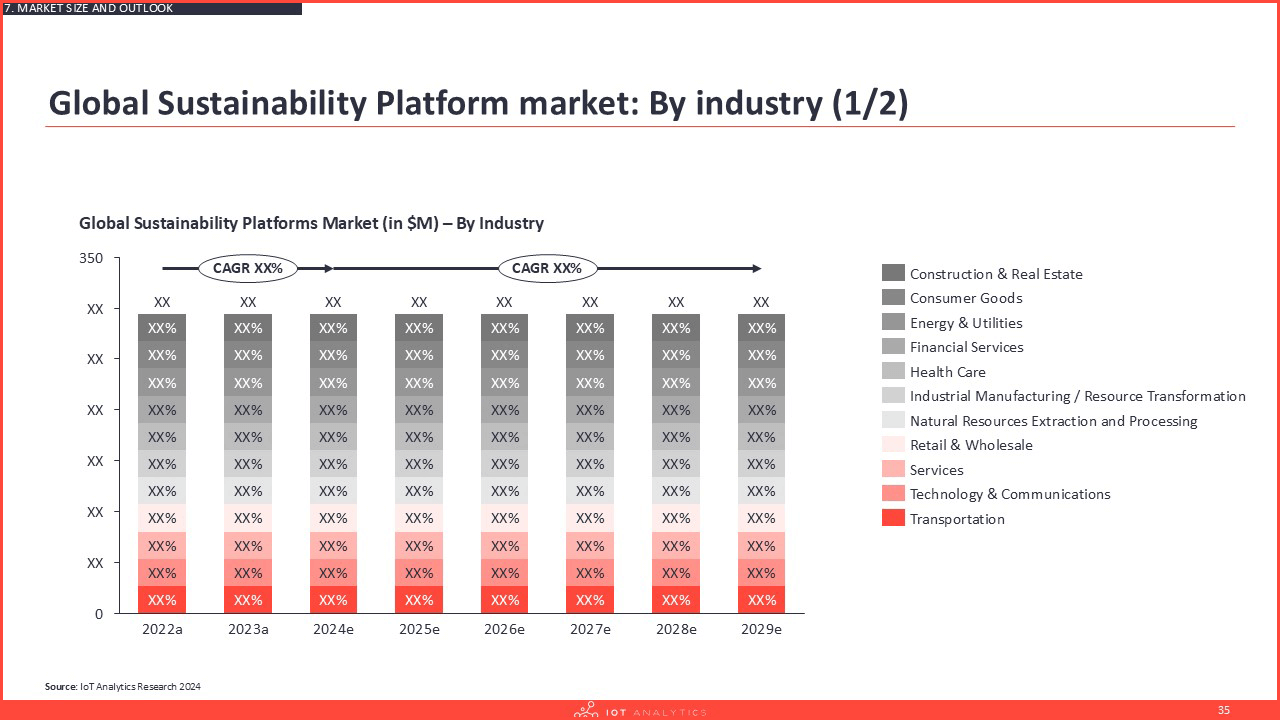
Download a sample to learn more about the report structure, select definitions, select market data, additional data points, and trends.
Already a subscriber? View your reports here →
The role of sustainability platforms in climate action and ESG compliance
Sustainability platforms are becoming essential for corporate compliance. Sustainability platforms enable companies to monitor carbon emissions, measure sustainability and ESG metrics, and comply with evolving regulatory requirements such as the EU’s CSRD and other global standards. Beyond compliance, sustainability platforms help organizations integrate sustainability into their operations, providing transparency for investors, customers, and regulators. They support businesses in setting and tracking sustainability goals, improving resource efficiency, and ensuring accountability across supply chains. As sustainability becomes a strategic priority rather than just a reporting obligation, these platforms are positioned to become a standard component of corporate management systems.
Sustainability platform types
IoT Analytics research identified 3 main sustainability platform categories: 1) ESG management and reporting, 2) carbon management, and 3) supply chain sustainability.*
*Note: The Sustainability Management Platforms Market Report 2025–2029 does not include supply chain sustainability platforms in its sustainability platforms market sizing; however, these platforms are generally addressed in the report.
ESG management & reporting platforms
ESG management and reporting platforms address a broad spectrum of ESG factors, including environmental performance (e.g., carbon emissions, energy use, water use, and waste generation), social responsibility (e.g., labor practices and community engagement), and governance (e.g., board diversity and business ethics), both for the organization and its suppliers. These platforms accounted for 61% of the sustainability platform market in 2024 and are expected to maintain a majority share throughout the decade.
Carbon management platforms
Carbon management platforms only cover the environmental dimension. Carbon management platforms are software platforms specifically designed to help organizations monitor, manage, and mitigate their carbon footprint and, more broadly, their environmental impact. Though trailing ESG management and reporting platforms in terms of market size, IoT Analytics forecasts carbon management platforms to gain market share through 2030.
Supply chain sustainability platforms
Supply chain sustainability platforms focus on scope 3 emissions and other supply chain-related impacts. While IoT Analytics does not include standalone supply chain sustainability platforms in its sustainability platform market sizing, these platforms promote sustainable practices among suppliers and throughout production processes by addressing 3 emissions, including indirect emissions from supply chain activities. Supply chain sustainability platforms can also be used to track the broader environmental and social impacts associated with the supply chain.
Sustainability platform competitive landscape
The sustainability platform market is highly fragmented. IoT Analytics research identified over 200 vendors offering platform solutions. No company can be considered dominant or much ahead of the competition, highlighting that the market is fragmented. The top 10 vendors account for one-third of the global market value, and the top 20 contribute to less than half of the global market value.
Leading sustainability platform market vendors
The following companies are among the leading sustainability platform vendors:
Salesforce
US-based cloud-based software company Salesforce offers Net Zero Cloud offering, a sustainability management solution that enables organizations to track, analyze, and report their carbon emissions and other sustainability data.
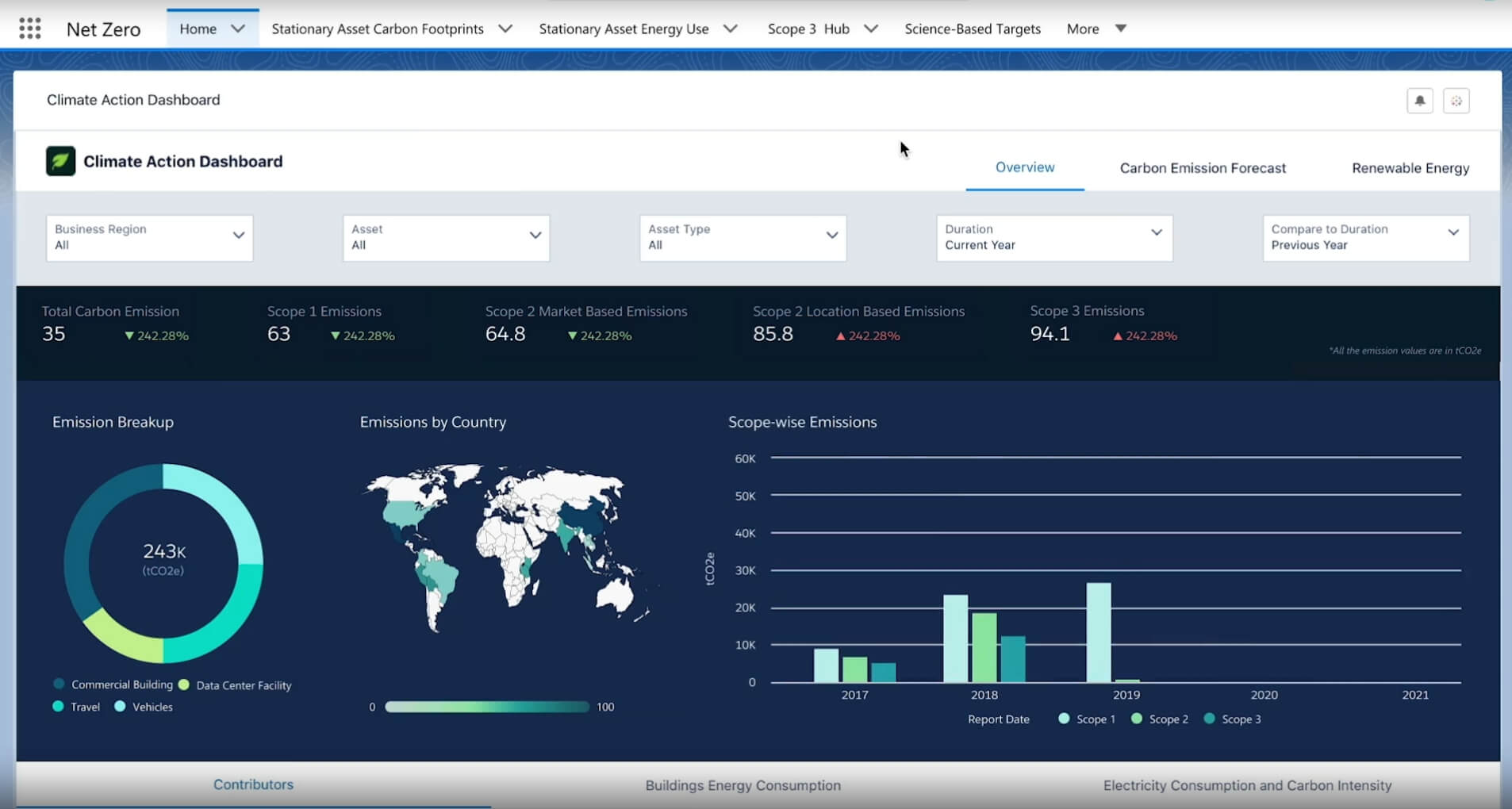
Salesforce Net Zero Cloud’s climate action dashboard for carbon footprint tracking (Source: Salesforce)
Sphera
US-based integrated risk management and data solutions software company Sphera offers SpheraCloud Corporate Sustainability software aimed to help organizations measure and manage their portfolio’s carbon footprint, assess climate-related risks and opportunities, integrate climate strategies, and meet ESG reporting requirements.
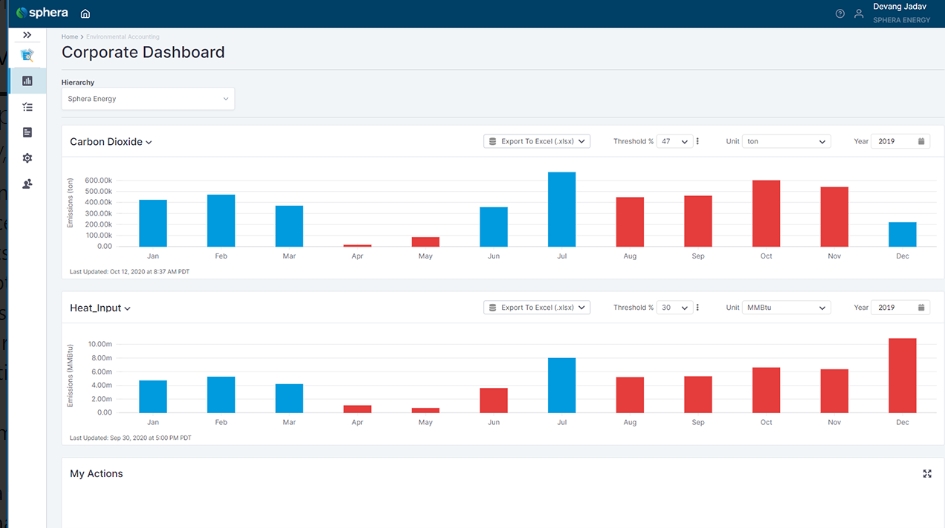
Energy usage and emissions dashboard on SpheraCloud Corporate Sustainability platform showcasing various emissions (source: Sphera’s Azure Marketplace site)
IBM
In 2022, US-based information technology and software company IBM acquired Envizi, an Australia-based data and analytics software provider, to expand the former’s environmental performance management portfolio. Now a platform offering, Envizi includes a Decarbonization category with tools designed to help businesses monitor, analyze, report, and improve energy usage and emissions.
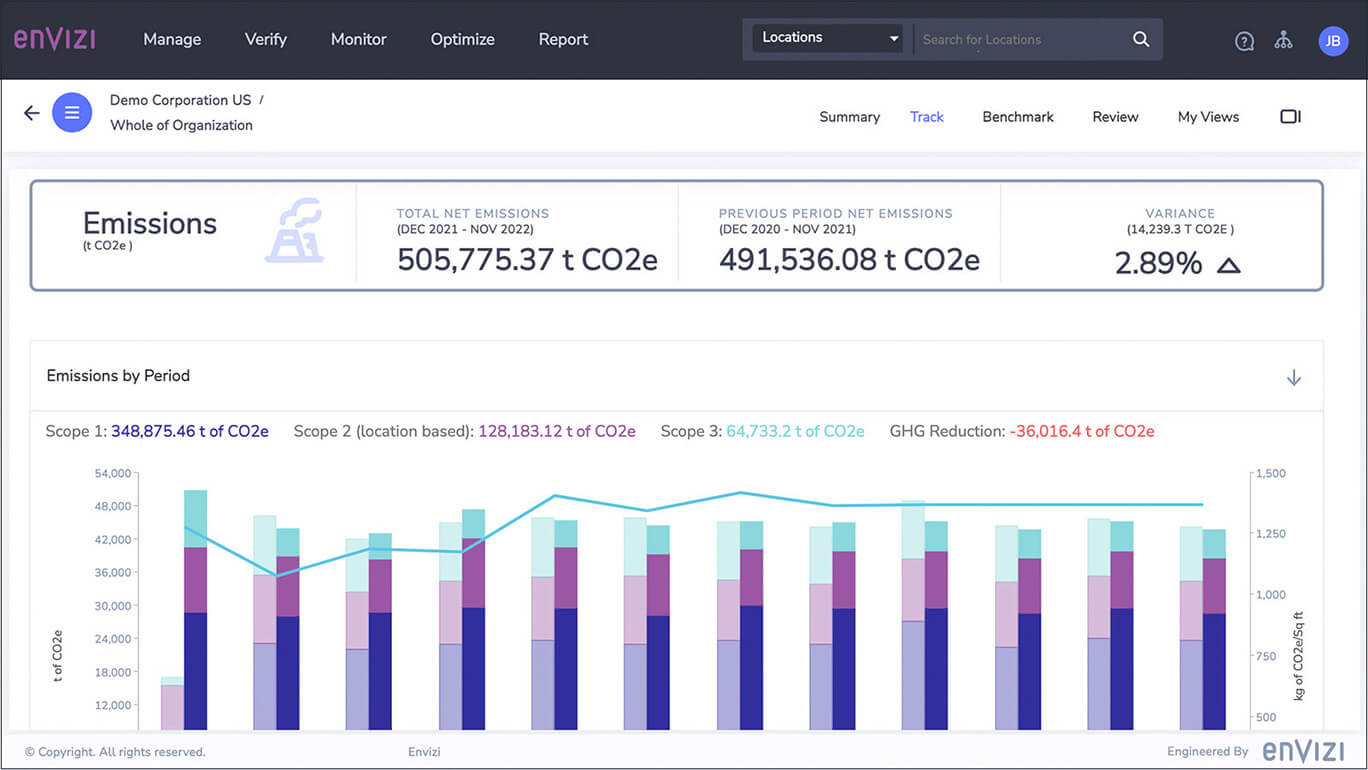
IBM Envizi embedded emissions calculation engine built on the Greenhouse Gas Protocol (or GHG Protocol)showcasing scope 1 and 2 emission levels (Source: IBM)
SAP
Germany-based enterprise resource planning (ERP) software provider SAP offers Sustainability Control Tower, a comprehensive platform that helps organizations manage and report on their sustainability performance. Powered by the SAP Business Technology Platform (SAP BTP), SAP Data Warehouse Cloud, and SAP Analytics Cloud, it consolidates data across various functions to provide insights, track progress toward sustainability goals, and ensure compliance with regulatory standards.
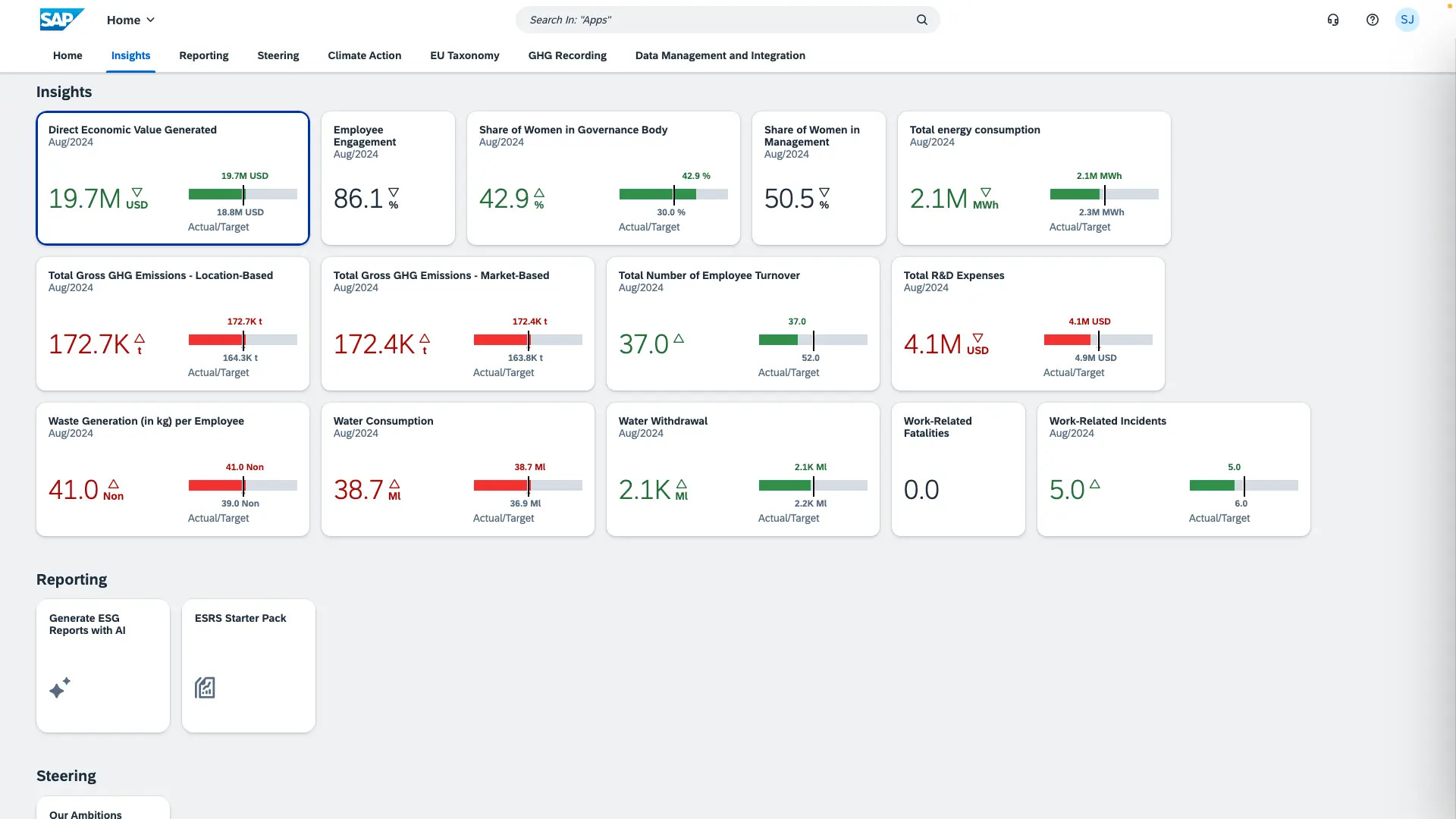
SAP’s Sustainability Control Tower insights dashboard showcasing various ESG metrics, including workplace diversity, emissions, and resource consumption (Source: SAP)
Microsoft
US-based software company and hyperscaler Microsoft offers Microsoft Sustainability Manager, a carbon management tool to record, report, and reduce an organization’s environmental impact. Built on the capabilities of Common Data Model, Microsoft Teams, and Microsoft Power Platform, it enables businesses to unify data intelligence for tracking and reporting environmental impact, including carbon emissions, water usage, and waste management, helping them enhance their sustainability strategies and manage their environmental responsibilities.
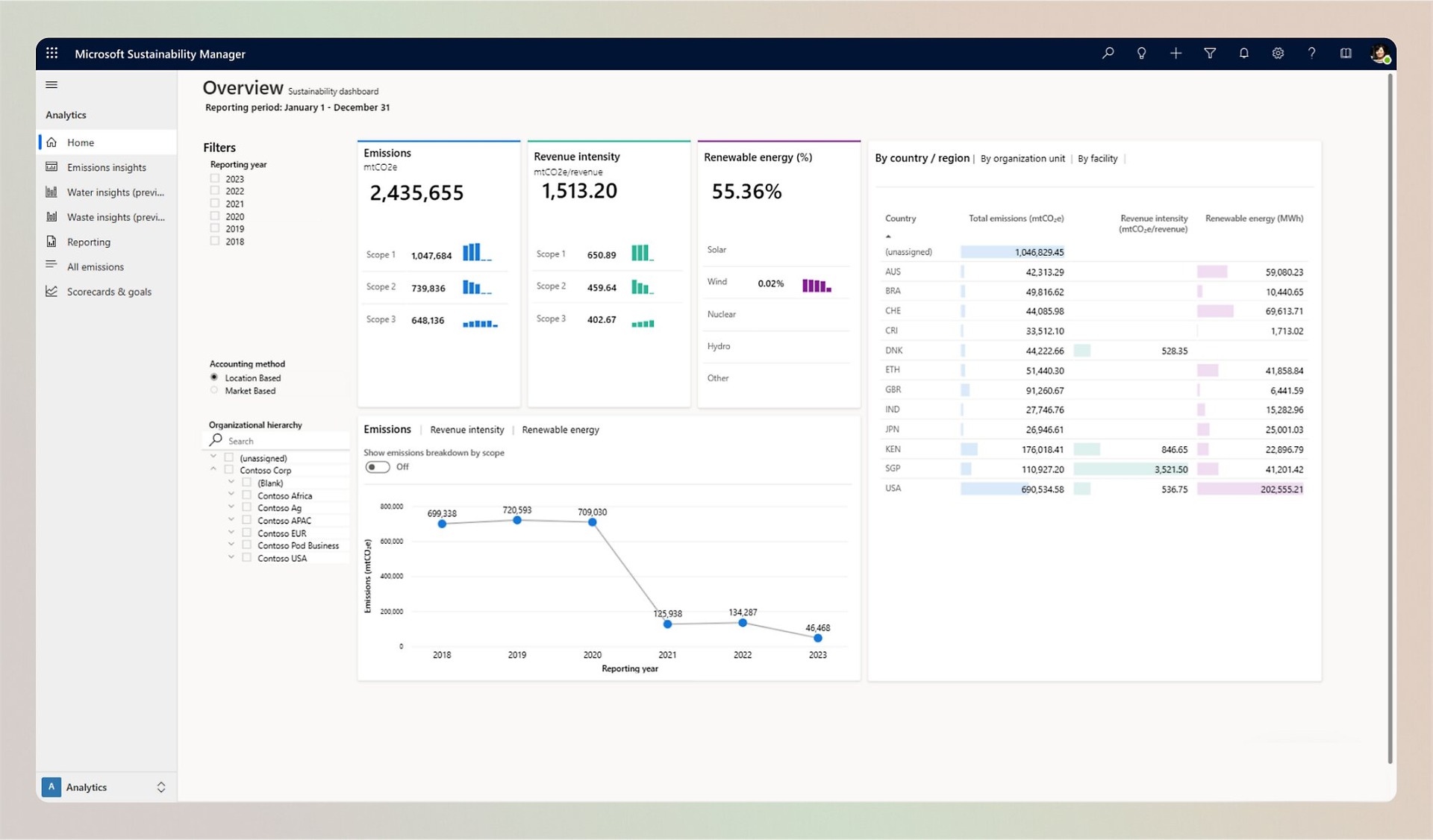
Microsoft Sustainability Manager overview dashboard showcasing scope 1, 2, and 3 emissions, renewable energy usage, and other sustainability metrics (Source: Microsoft)
Analyst opinion: Sustainability platform market outlook
Regulatory pressure likely to drive further adoption. Sustainability platforms are increasingly influenced by evolving regulatory frameworks. With mandatory ESG reporting expanding across regions, like the EU’s CSRD, companies must invest in sustainability platforms to ensure compliance. The growing complexity of carbon taxation, emissions trading systems, and supply chain disclosure mandates will push more organizations to adopt robust sustainability management solutions.
Sustainability platforms looking to become a standard component of enterprise software. As sustainability initiatives become core to business operations, sustainability platforms will no longer be standalone tools but rather integrated into broader enterprise software ecosystems (Which is also why some of the leading vendors are large enterprise software companies like SAP, Salesforce, or Microsoft). Vendors are embedding these capabilities into ERP, financial management, and industrial automation solutions, ensuring sustainability data flows seamlessly across operational and financial processes. Companies will increasingly rely on automated, real-time data capture and analytics to support ESG decision-making.
Market offerings are evolving. Despite the growing demand, sustainability platforms remain relatively immature, with gaps in interoperability, data standardization, and end-to-end supply chain visibility. However, vendors are addressing these challenges by enhancing ESG report-building functionalities and integrating IoT capabilities. For example, In January 2024, Germany-based industrial automation company Siemens launched Building X Sustainability Manager with its Building X digital building platform, incorporating real-time data extraction from energy meters, improving emissions tracking. Additionally, platforms are improving their ability to leverage sustainability data across the supply chain, enabling organizations to assess supplier compliance, track Scope 3 emissions, and optimize resource efficiency.
AI to play a larger role in sustainability management. AI is becoming a key enabler of sustainability platforms, enhancing automation, anomaly detection, and predictive insights. AI-driven ESG data analysis, regulatory compliance recommendations, and natural language processing tools for report generation are already emerging. Companies like Sweep, a France- and UK-based sustainability data management software company, have integrated generative AI to streamline emissions calculations and ESG disclosures. The tool for example claims to use AI to provide a suggested mapping of financial and impact materiality based on industry benchmarks. As AI capabilities mature, sustainability platforms are likely going to become more proactive, offering prescriptive insights and automated risk mitigation strategies.
Poor data quality remains the biggest challenge. Despite technological advancements, data quality issues continue to hinder sustainability platform adoption. Many organizations struggle with incomplete, inconsistent, or unreliable ESG data, making accurate reporting and decision-making difficult. In a 2024 survey of executives from UK-based global professional services company Deloitte, 76% of executives cite data quality as a primary concern, with 88% ranking it among their top three challenges. Without improvements in data standardization, governance, and verification processes, sustainability initiatives will remain constrained by unreliable inputs.
Disclosure
Companies mentioned in this article—along with their products—are used as examples to showcase market developments. No company paid or received preferential treatment in this article, and it is at the discretion of the analyst to select which examples are used. IoT Analytics makes efforts to vary the companies and products mentioned to help shine attention to the numerous IoT and related technology market players.
It is worth noting that IoT Analytics may have commercial relationships with some companies mentioned in its articles, as some companies license IoT Analytics market research. However, for confidentiality, IoT Analytics cannot disclose individual relationships. Please contact compliance@iot-analytics.com for any questions or concerns on this front.
More information and further reading
Are you interested in learning more about Sustainability platforms?
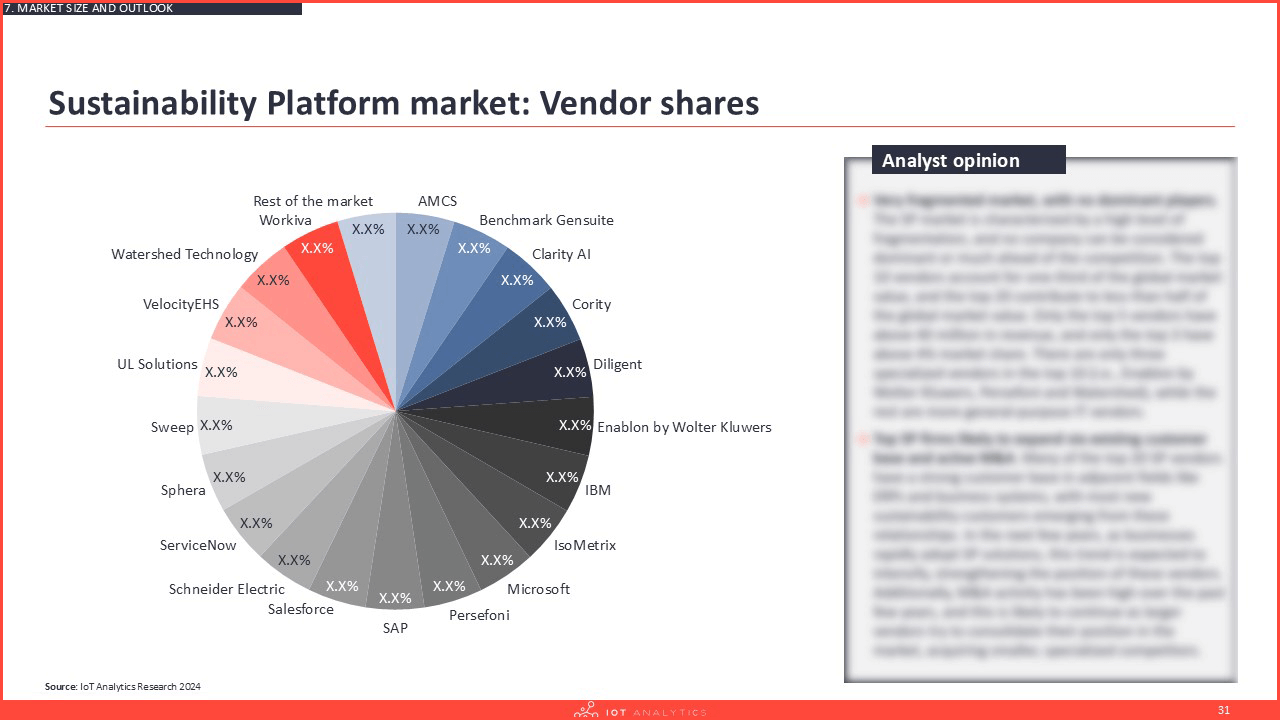
Already a subscriber? View your reports here →
Related articles
You may also be interested in the following articles:
- What CEOs talked about in Q4 2024: Tariffs, reshoring, and agentic AI
- What CEOs talked about in Q3 2024: Practical AI applications, renewable energy sources, and unpredictable IT outages
- Top 5 enterprise technology priorities: AI on the rise, but cybersecurity remains on top
Related publications
You may also be interested in the following reports:
- Generative AI Market Report 2025-2030
- Smart Factory Adoption Report 2024
Subscribe to our newsletter and follow us on LinkedIn and Twitter to stay up-to-date on the latest trends shaping the IoT markets. For complete enterprise IoT coverage with access to all of IoT Analytics’ paid content & reports, including dedicated analyst time, check out the Enterprise subscription.
Leave a Comment